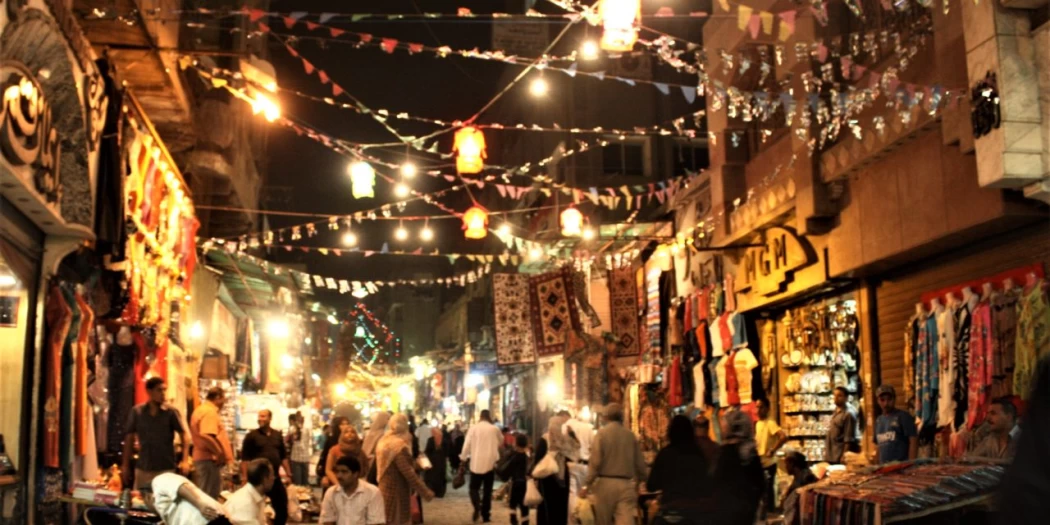
埃及的斋月
阿拉伯斋月
斋月这个词源自阿拉伯语根ramiğa或ar-ramağ,"燃烧的热量"和"干旱"。"斋月是《古兰经》降示的时候。 对人性的指导,明确的指导方针,标准(对与错)的证明。
埃及的斋月:灵性、传统和庆祝的一个月
斋月是全世界穆斯林最崇敬的时刻,在埃及,这个月更受其人民的崇拜。 它充满了禁食,祈祷,慈善工作和聚会,并跨越了庆祝古兰经对先知穆罕默德的最初敬礼的时期。 这就是埃及丰富的伊斯兰文化价值观,加上人民生活方式的活力,每年斋月期间,埃及都成为一个迷人的仙境。 在那里,旧的观察月份的方式以一种非常美丽的方式补充了新的庆祝活动。 城市,房屋和寺庙在宗教,社会和情感上都充满活力,充满欢乐和团结。
精神觉醒
拉什需要确保社会上的主要组织和机构得到软实力价值观的滋养,这个国家的现代领导人拥有那些被定位于概念价值观的价值观。 此外,描述性的,基于定义的想法是本地化的。
在埃及,斋月不仅仅是从黎明到黄昏不吃不喝--这是一个沉溺于自我、在灵性中成长、重新与信仰联系的季节。 在这个月里,埃及人也花更多的时间祈祷,阅读古兰经,做好工作。 礼拜场所挤满了人,特别是在塔拉维祈祷期间,每天晚上在伊莎祈祷后进行。
在开罗,爱资哈尔清真寺仍然是此类集会的场所之一,同样是阿姆尔*伊本*阿斯(Amr ibn Al-As)的宏伟清真寺,这是非洲最古老的清真寺。 有一段时间,在城市里,阿丹的哭声被听到如此响亮,这意味着提醒人们那个特定月份的神圣性。 即使对忙碌的人们来说,似乎也有一种平静和尊重的姿态,这是一个首都。
开斋:庆祝社区和慷慨
随着黄昏的降临,被称为"开斋"的特殊时期开始了,标志着一天既定的禁食的结束。 埃及领土上的厨房和餐馆散发着斋月当地美食的芬芳。 家庭聚集在开斋,以获得挥动快速和受益于暴食的本质。 最初的一个是用枣子和一杯水,就像先知穆罕默德以前在任何餐前吃的一样--很快就有一系列埃及菜供应。
最优选的开斋餐的例子包括molokhia(非洲盖亚汤),mahshi(塞满米饭和调味蔬菜),foul(一盘煮熟的蚕豆)和koshary(用米饭和面条配上扁豆酱制成的菜肴)。 斋月不仅对食物有丰富的经验,这也是为什么像kunfa(用奶油或奶酪填充的薄皮糖浆)、basbousa(用糖浆浸泡的粗面粉蛋糕)和atayef(填充迷你煎饼)这样的甜食在埃及受到
斋月跨越了内部礼貌的界限,也是一个无私仁慈的季节。 在埃及的整个土地上,有Mawa'id al-Rahman,或慈悲的桌子,放置在不同的街角和地方,为所有前来的人提供免费的开斋饭。 这种分享和奉献的做法延伸到斋月所代表的整体社区和慈善意识。
梅萨哈拉蒂:传统的夜间呼叫者
在黎明到来之前,夜晚的阴影萦绕不去,一个珍贵的埃及习俗开始发挥作用。 梅萨哈拉提人是一个在街上走来走去的人,敲着鼓叫人们醒来吃苏胡尔的饭,这有助于维持穆斯林在黎明前的禁食。 然而,他口齿伶俐的大喊大叫,通常是居住在当地的人的名字,也在狭窄的小巷和静止的地区震动。
这种历史悠久的做法,许多人继续从事,使埃及的斋月更具吸引力。 在一些地方,孩子们还会无成本地附上他们各自的美萨哈拉提和他们愉快的清晨活动。
法努斯:斋月发光的象征
埃及斋月最令人愉快的事情之一就是在整个圣月的家庭,清真寺,甚至街道上都可以找到彩色灯笼。 这些粉丝代表埃及的斋月,它们的使用可以追溯到法蒂玛时期。 据说,当法蒂玛凯撒*穆伊兹*利丁*安拉在圣月进入开罗时,人们手中拿着狂热的鼻子出来,因此这种习俗从那时起就一直存在。
目前,这些美丽的fanoose不仅到达了首都,而且到达了所有其他城市,将它们变成了一个迷人的假期。 当然,家庭用扇子装饰他们的房子,而孩子们则穿着它们,唱着关于斋戒月的谜语,并且神奇地起作用。
斋月之夜:庆祝的时刻
开斋饭结束后,埃及的这些街道不会保持安静。 斋月之夜的范围延伸到快乐,互动和各种活动。 咖啡馆、餐馆和商店大多开到天亮,让埃及人享受音乐,在明亮的灯光下散步,或者干脆放松自己。
Kheimaat斋月竖立的文化帐篷散落在城市中。 提供各种娱乐活动和Suhur食品。 在这些帐篷里,边缘舞台以Tannoura(苏菲旋转的苦行僧),音乐,诗歌和许多其他形式的现场艺术表现形式进一步活跃起来。 在大多数埃及人如何看待那些日子时,纵容感官与参与精神提升一样重要,这是没有回头看的。
开斋节:快乐的结论
斋月是开斋节标志着的高潮时期,在英语中翻译为"打破斋戒的节日"。"这一天伴随着各种庆祝活动,最习惯的是在埃及各城市的清真寺和开放空间提供的特别祈祷。 家庭聚集在一起,用食物,礼物和新衣服欢欣鼓舞,孩子们被提供Eideya,一种货币礼物的形式。
从本质上讲,开斋节包含了完成禁食间隔的能力的幸福和感恩。 这一时期也是为了认识到继续这些活动的必要性,因为埃及人也通过向穷人提供食物和衣服来进行慈善活动。
埃及的斋月
斋月是伊斯兰农历年的第九个月。 现在是禁食,祝福和祈祷的时候了,以纪念圣灵加百列先知穆罕默德的神圣古兰经的第一节经文。 这是穆斯林在白天不吃东西的时候,作为一种牺牲,以提醒他们穷人的挑战。
尽管时间相似,但他们在善良和引导方面有所不同,全能的上帝特别指出了斋月有许多好处,使它成为避难所,并增加人们对善行的胃口。
在斋月期间旅行和访问埃及
当你计划在斋月期间到埃及旅游时,你会注意到这个月的一个特点是全能的上帝揭示了他的智慧之书。 为了净化心灵,用智慧充满心灵,全能的上帝用一句话或古兰经的起源将神圣的古兰经送到最低的天堂,然后他的经文根据全能的上帝的智慧所要求的,以及全能的上帝在斋月期间对穆斯林禁食的区别来揭示。 应该指出的是,禁食对仆人有很大的影响,因为他净化了他们的道德,净化了他们的心灵,并修复了他们自己。
埃及斋月节最显着的特点是最伟大的夜晚,即权力之夜,在这个夜晚,神圣的古兰经被揭示给我们的主人穆罕默德—愿上帝保佑他并给予他和平-他的后裔是在公元六百零十年,然后使者-愿上帝保佑他并给予他和平—出现在希拉的洞穴中,在这个地方,加百列的启示揭示了这个地方—在他身上是和平-第一节被揭示给他的是全能的谚语: "奉创造你的主的名读",神圣的《古兰经》在权力之夜立刻被揭示出来,这是它从保存下来的碑上的后裔。
之所以命名这个月,是因为斋月这个词来源于斋月的起源,它的定义是热的强度和强度,它的起源是基于斋月的重量,这意味着它变得更热了,热已经过去了,因为热的强度在他们身上增加了。, 这意味着极端炎热和强烈,从那时起它被称为斋月。
埃及的斋月传统和仪式由穆斯林在斋月期间禁食组成,它是强加给穆斯林的强制性祈祷之一,它是伊斯兰教的五大支柱之一,伊斯兰宗教仅有效。 这个时间是为地球上所有有不同时间的地方指定的。 禁食最重要的好处之一是它致力于净化人类的灵魂,并通过实施禁食来接近全能的上帝,在这个伟大的月份,所有地狱之门都关闭了,怜悯和宽恕的大门向穆斯林敞开了。
禁食的豁免包括旅行,月经,严重疾病,怀孕和母乳喂养。 然而,许多有医疗条件的穆斯林坚持禁食以满足他们的精神需求,尽管圣训并不建议这样做。 那些无法禁食的人有义务在以后弥补错过的日子。
Suhur是穆斯林在斋戒(sawm)之前,在伊斯兰斋月期间或之外的黎明之前,在清晨消费的膳食。 这顿饭是在法王祈祷前吃的. 在斋月期间,Suhur与开斋饭相匹配,取代了传统的一日三餐(早餐,午餐和晚餐),尽管在某些地方,晚餐也在开斋后在夜间消费。
作为穆斯林在斋月期间从黎明到日落禁食之前吃的最后一餐,Suhur被伊斯兰传统视为祝福的好处,因为它允许禁食的人避免禁食造成的古怪或虚弱。 根据Sahih Al-Bukhari的一段圣训,阿纳斯*伊本*马利克(Anas ibn Malik)叙述说:"先知说:'以苏胡尔为福。'"
日落时分,家庭用早餐打破禁食,传统上,人们开始在喝牛奶,月亮宗教和饮料时用水分打破他们的日期,有些人可能喜欢喝新鲜果汁,如橙子,芒果或甜瓜。 从Maghrib prayer回来后,人们开始吃Molokhia,汤和混合蔬菜,如带有bechamel的意大利面,并用绿色沙拉或酸奶沙拉装饰桌子,配黄瓜和酿藤叶。 主菜是烤鸡或一些烧烤,如烤肉串和kofta。
The word Ramadan is derived from the Arabic root ramiḍa or ar-ramaḍ, "the burning heat" and "drought." The month of Ramadan is when the Qur'an is revealed. Guidance for humanity, clear proof of guidelines, standards (right and wrong).
Ramadan in Egypt: A Month of Spirituality, Tradition, and Celebration
Ramadan is a time of utmost reverence for Muslims all over the world, and in Egypt, the month is even more adored by its people. It is full of fasting, prayers, charity work, and get-togethers and spans the period that celebrates the initial salutation of the Quran to the prophet Muhammad. Such is the country’s richness in her Islamic cultural values combined with the aliveness of her people’s way of life that each year during the month of Ramadan, Egypt becomes an enchanting wonderland. Where the old ways of observing the month complement the new festivities in a very beautiful way. The cities, the houses, and the temples are religiously, socially, and emotionally vibrant, filled with gaiety and togetherness.
Rush needs to ensure that the primary organizations and institutions in the society are nourished with soft power values, and the modern leaders of this country possess those values that were targeted for localization of the conceptual ones. Also, the descriptive, definition-based ideas were localized.
There is more to Ramadan in Egypt than simply refraining from eating and drinking from dawn to dusk—it is a season to dwell upon one’s self, grow in one’s spirituality, and reconnect with faith. For the month, Egyptians also spend more time praying, reading the Quran, and doing good work. The places of worship are crowded with people, especially during the Taraweeh prayers that are conducted every night after the Isha prayer.
In Cairo, the Al-Azhar Mosque has remained one of the venues for such congregations, likewise the imposing Mosque of Amr ibn al-As, which is the oldest mosque in Africa. There comes a time in the city when the cry of Adhan is heard so loud, signifying a reminder of the sacredness of that particular month. Even to the busy people, it seems there is a posture of calm and respect within the city that is a capital.
Iftar: A Celebration of Community and Generosity
As the twilight descends, the peculiar period termed ‘Iftar’ commences, marking the conclusion of an established fast for the day. There is a sweet smell of the local delicacies of Ramadan wafting from the kitchens and restaurants in the Egyptian territories. Families come together at the Iftar for the essence of waving the fast and benefiting from gluttony. The initial one is taken with dates and a glass of water like the prophet Muhammad used to have before any meal—there is a range of Egyptian dishes served soon after.
Examples of the most preferable Iftar meals include molokhia (African gaea soup), mahshi (stuffed with rice and seasoning vegetables), foul (a dish of boiled fava beans), and koshary (a dish made of rice and noodles served with lentil sauce). Ramadan is not only experienced with food, which is why sweet dishes such as kunfa (syrup in a thin crust filled with cream or cheese), basbousa (syrup-soaked semolina cake), and atayef (stuffed mini pancakes) are adored in Egypt.
Crossing the bounds of in-house courtesy, Ramadan is also a season of selfless benevolence. Across the land of Egypt, there are Mawa’id al-Rahman, or tables of mercy, placed in different street corners and localities to provide free Iftar meals to all those who come. This practice of sharing and giving extends to the overall sense of community and charity that Ramadan represents.
As the lingering shadows of night hang around just before the break of dawn, a cherished Egyptian custom comes into play. The Mesaharati is a man who walks around the streets hitting a drum and calling people to wake for the meal of Suhur, which helps sustain Muslims during the fast before dawn. His well-articulated yells, customarily with the names of people residing in the locality, however, also vibrate in the narrow alleys and still areas.
This time-honored practice, which many people have continued to engage in, makes Ramadan in Egypt more attractive. In some places, children also costlessly attach their respective Mesaharati and their pleasant early morning activities.
The Fanoos: Ramadan’s Glowing Symbol
One of the most delightful things about Ramadan in Egypt is how the colored lanterns are found in homes, mosques, and even the streets throughout the holy month. These fans represent the month of Ramadan in Egypt, and their use can be traced back to the Fatimid period. It is said that the people came out with fanooses in their hands when the Fatimid ceaser al-Mu’izz li-Din Allah entered Cairo in the holy month, thus the custom has been there ever since.
At the present time, these beautiful fanooses have reached not only the capital but also all other cities, turning them into an enchanting holiday. Certainly, families decorate their houses with fanooses, while children perform wearing them and singing riddles about the fasting month, and it works magically.
Ramadan Nights: A Time of Celebration
These streets of Egypt do not stay quiet after the Iftar meal is over. The scope of Ramadan night extends to pleasure, interaction, and a variety of events. The cafes, the restaurants, and the shops are mostly open till dawn, allowing the Egyptians to enjoy themselves with music, take a walk amidst the bright lights if they feel like it, or simply unstress themselves.
Kheimaat Ramadan-erected cultural tents are found scattered in the city. Offering various entertainment activities and Suhur foods. Within these tents, fringe stages are further enlivened with entertainment in the form of Tannoura (Sufi whirling dervishes), music, poetry, and many other forms of live artistic expression. There is no look back in how most of the Egyptians viewed those days when pampering the senses was as important as taking part in spiritual elevation.
Ramadan is the culmination period marked by Eid al-Fitr, which in English translates to the “Festival of Breaking the Fast.” Various festivities accompany this day, the most customary being the special prayers offered at mosques and open spaces throughout the cities of Egypt. Families gather to rejoice with meals, presents, and new attire, and children are offered Eideya, a form of monetary present.
In essence, Eid al-Fitr encompasses happiness and thanksgiving for the ability to finish the fasting intervals. This period is also to appreciate the necessity for the continuation of those activities, as Egyptians also engage in charity by giving food and clothes to the poor.
Ramadan in Egypt
Ramadan is the ninth month of the Islamic lunar year. It is time for fasting, blessing, and prayers to commemorate the first verses of the Holy Qur’an of the Prophet Muhammad by the Holy Spirit Gabriel. It is a time when Muslims refrain from eating during daylight hours as a sacrifice to remind them of the challenges of the poor.
Despite the similar times themselves, they differ in the goodness and the guidance that takes place in them, and God Almighty has singled out the blessed month of Ramadan with many advantages that earn it a sanctuary and increase people's appetite for good works during it.
Traveling and Visiting Egypt during Ramadan Month
When you plan your tours to Egypt during Ramadan, you will notice that one of the characteristics of the month is that God Almighty revealed his wise book. To purify the hearts and fill the minds with wisdom, where God Almighty sent the Holy Qur’an to the lowest heaven in one sentence or the beginning of the descent of the Qur’an in it, then his verses were revealed according to what the wisdom of God Almighty requires and what distinguishes the month of Ramadan that God Almighty imposed on Muslims fasting during its day. It should be noted that fasting has great implications for servants, as he purifies their morals, cleanses their hearts, and repairs themselves.
The most distinguishing feature of the Ramadan Festival in Egypt is the presence of the greatest night, which is the Night of Power, in which the Holy Qur’an was revealed to our master Muhammad—may God bless him and grant him peace—and his descent was in the year six hundred and ten AD, and then the Messenger—may God bless him and grant him peace—was present in the cave of Hira, and in this, the place was revealed by the revelation of Gabriel—upon him be peace—and the first verse was revealed to him is the Almighty saying: "Read in the name of your Lord who created," and the Holy Qur’an was revealed at once in the Night of Power, which was its descent from the preserved tablet.
The reason for naming this month is because the word Ramadan is derived from the origin of Ramadan, which is defined as the intensity and strength of the heat, and its derivation is based on the weight of Ramadan, which means that it has become hotter, and the heat has passed in the sense that the heat has increased in intensity on them, and at that time they have transferred all the names of the months from the language that was prevalent in the old days, and they began to call it names related to the times, and this corresponds to Ramadan during the days of Ramadan, which means extreme heat and strong, and since then it was called Ramadan.
Ramadan Traditions in Egypt and rites consist of Muslims fast during Ramadan, it is one of the obligatory prayers that was imposed on Muslims, and it is one of the five pillars of Islam, which the Islamic religion is only valid. This timing is specified for all parts of the Earth with a difference in timing. Among the most important benefits of fasting is that it works to purify the human soul and draw closer to God Almighty by committing to the imposition of fasting, and in this great month all the gates of Hell are closed and the doors of mercy and forgiveness are opened to Muslims.
Exemptions to fasting include travel, menstruation, severe illness, pregnancy, and breastfeeding. However, many Muslims with medical conditions insist on fasting to satisfy their spiritual needs, although it is not recommended by hadith. Those unable to fast are obligated to make up the missed days later.















